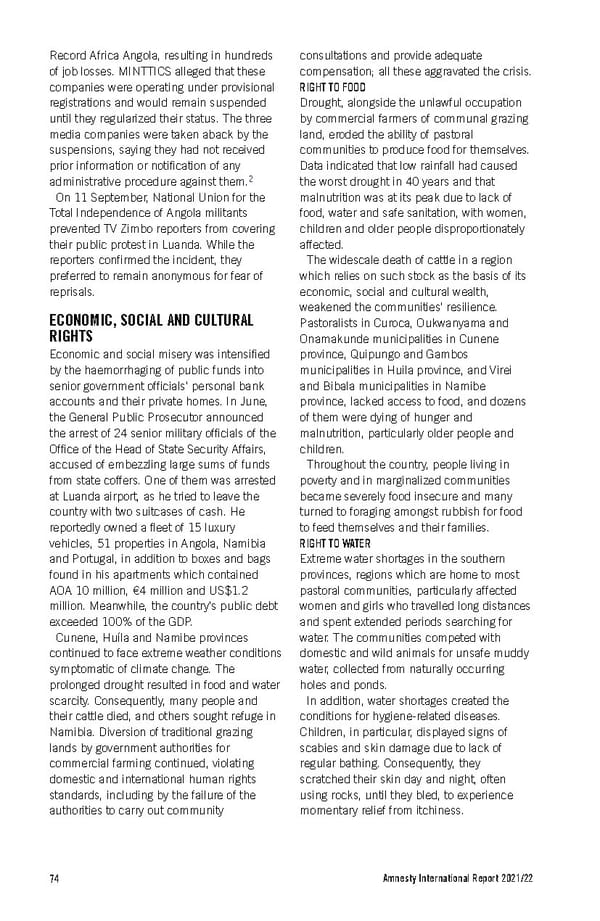Record Africa Angola, resulting in hundreds consultations and provide adequate of job losses. MINTTICS alleged that these compensation; all these aggravated the crisis. companies were operating under provisional RIGHT TO FOOD registrations and would remain suspended Drought, alongside the unlawful occupation until they regularized their status. The three by commercial farmers of communal grazing media companies were taken aback by the land, eroded the ability of pastoral suspensions, saying they had not received communities to produce food for themselves. prior information or notification of any Data indicated that low rainfall had caused 2 administrative procedure against them. the worst drought in 40 years and that On 11 September, National Union for the malnutrition was at its peak due to lack of Total Independence of Angola militants food, water and safe sanitation, with women, prevented TV Zimbo reporters from covering children and older people disproportionately their public protest in Luanda. While the affected. reporters confirmed the incident, they The widescale death of cattle in a region preferred to remain anonymous for fear of which relies on such stock as the basis of its reprisals. economic, social and cultural wealth, ECONOMIC, SOCIAL AND CULTURAL weakened the communities’ resilience. RIGHTS Pastoralists in Curoca, Oukwanyama and Onamakunde municipalities in Cunene Economic and social misery was intensified province, Quipungo and Gambos by the haemorrhaging of public funds into municipalities in Huila province, and Virei senior government officials’ personal bank and Bibala municipalities in Namibe accounts and their private homes. In June, province, lacked access to food, and dozens the General Public Prosecutor announced of them were dying of hunger and the arrest of 24 senior military officials of the malnutrition, particularly older people and Office of the Head of State Security Affairs, children. accused of embezzling large sums of funds Throughout the country, people living in from state coffers. One of them was arrested poverty and in marginalized communities at Luanda airport, as he tried to leave the became severely food insecure and many country with two suitcases of cash. He turned to foraging amongst rubbish for food reportedly owned a fleet of 15 luxury to feed themselves and their families. vehicles, 51 properties in Angola, Namibia RIGHT TO WATER and Portugal, in addition to boxes and bags Extreme water shortages in the southern found in his apartments which contained provinces, regions which are home to most AOA 10 million, €4 million and US$1.2 pastoral communities, particularly affected million. Meanwhile, the country’s public debt women and girls who travelled long distances exceeded 100% of the GDP. and spent extended periods searching for Cunene, Huíla and Namibe provinces water. The communities competed with continued to face extreme weather conditions domestic and wild animals for unsafe muddy symptomatic of climate change. The water, collected from naturally occurring prolonged drought resulted in food and water holes and ponds. scarcity. Consequently, many people and In addition, water shortages created the their cattle died, and others sought refuge in conditions for hygiene-related diseases. Namibia. Diversion of traditional grazing Children, in particular, displayed signs of lands by government authorities for scabies and skin damage due to lack of commercial farming continued, violating regular bathing. Consequently, they domestic and international human rights scratched their skin day and night, often standards, including by the failure of the using rocks, until they bled, to experience authorities to carry out community momentary relief from itchiness. Amnesty International Report 2021/22 74
 Amnesty International Report 2021/22 Page 73 Page 75
Amnesty International Report 2021/22 Page 73 Page 75